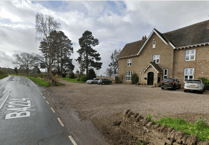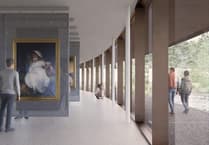Herefordshire is down to get a new £15m medical facility that will help spot potentially lethal conditions early.
“We have poor cancer survival rates, due largely to lack of access to diagnosis,” according to Dr David Mowbray, chief medical officer of Wye Valley NHS Trust which runs Hereford County Hospital as well as community health services such as Ross-on-Wye Community Hospital.
“But we have secured £15m to build a ‘diagnostic hub’ in Herefordshire, with MRI and CT scanning, ultrasound and blood testing – though it’s still at the early stages,” he said.
Speaking at a debate on health and social care in the county last week, organised by Hereford and South Herefordshire Labour Party, Dr Mowbray said another “poor” health outcome nationally is the number of stillbirths.
“The aspiration is to cut these by half by 2025, and in Herefordshire we are on track for that. Out of 54 health trusts nationally, we are already in seventh place.”
But he also identified ongoing problems with healthcare in the county. Young people with behavioural challenges, rather than mental health issues, “often present at A&E, and need specialist care and secure beds, which are like hens’ teeth”, he said.
“We still have a big issue with children’s mental health, especially with language and occupational therapy, which they need at a young age.”
Out of a total of 230 beds available , about 40 at any one time have patients that don’t need to be there, he said, adding: “But they can’t move on because they don’t have the care packages in place,”
One solution is to prioritise same-day emergency care, “so they don’t occupy our extremely limited beds”.
Meanwhile, there are currently “over 5,000” people on waiting lists in Herefordshire, he added.
Christine Price, chief officer of Healthwatch Herefordshire, said: “The NHS and social care are under more stress than they have ever been, especially dentistry.
“Yet I have never seen it working more collaboratively – even though as a consumer it can still feel fragmented. The limitation is the workforce, and no amount of money can fix the systemic issues.”
Dr Mike Hearne, managing director of Herefordshire General Practice which provides support services to the county’s surgeries, added on this: “All GPs and community teams in Herefordshire are now on the same computer system and we are in the top quartile in England for access to GPs. But GP numbers are dwindling.”
As a working GP in the county, “I used to go home for lunch,” he added. “Now I don’t even have time for lunch.”
Health care “is a political football” with “poorly planned” funding, he said. “We would gain a lot if we were just allowed to get on with it.”
Euan McPherson, chief executive of local health charity Services for Independent Living, added: “Recruiting staff is dreadful. Without that restriction, I could have doubled the size of my organisation.
“I started as a care worker. But caring is low-paid and for similar money you could work in a supermarket without the stress of caring for someone with complex needs.”
Dr Mowbray said on this: “Most people train in large conurbations and that’s where they want to work.” But as “one of the most isolated hospitals in England”, Hereford “has to offer all the specialisms, which we struggle to recruit into”.
As a result, “we are getting dependent on locums, some good, some indifferent, who don’t know our systems, and who are extremely costly”.
Typifying this, the county’s stroke service is “fragile” as it is currently run by two locums “who could leave next week”, he said, adding that plans to reorganise this are now being consulted on.
Anna Coda, Labour candidate for Hereford and South Herefordshire at the last general election, said: “We have to be careful about talking about an insurance-based system. You wouldn’t like the premiums. We should stick with the system we have.”
“Waiting lists almost disappeared under the last Labour government. But now there is no sense of urgency about health and social care.”





Comments
This article has no comments yet. Be the first to leave a comment.